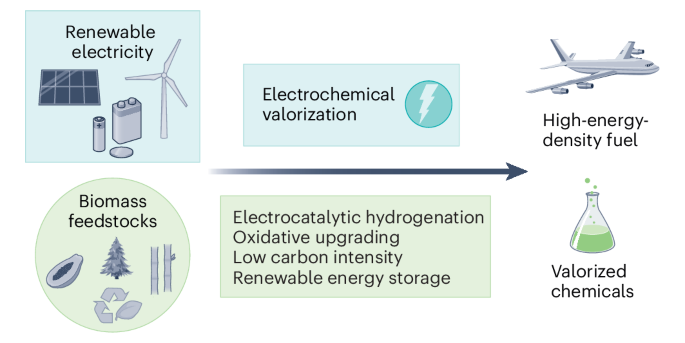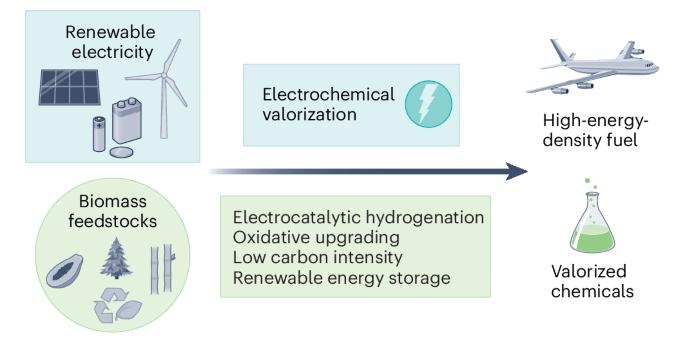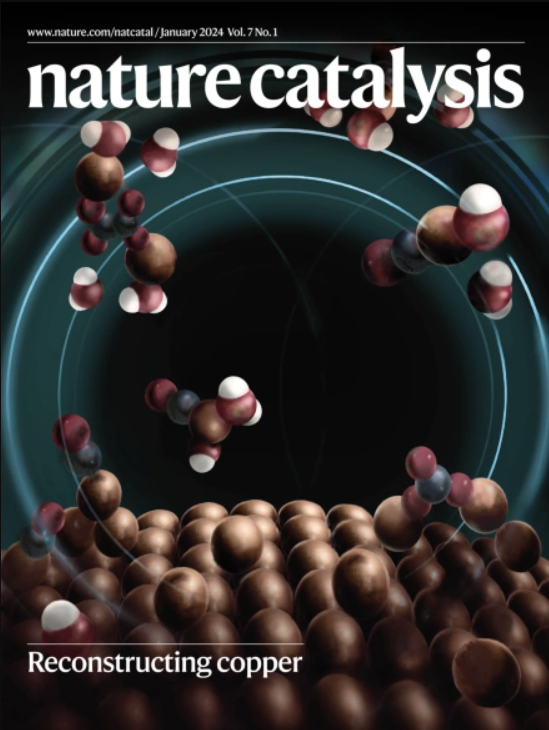Progress and roadmap for electro-privileged transformations of bio-derived molecules
IF 42.8
1区 化学
Q1 CHEMISTRY, PHYSICAL
引用次数: 0
Abstract
Biomass incorporates carbon captured from the atmosphere and can serve as a renewable feedstock for producing valuable chemicals and fuels. Here we look at how electrochemical approaches can impact biomass valorization, focusing on identifying chemical transformations that leverage renewable electricity and feedstocks to produce valorized products via electro-privileged transformations. First, we recommend that the field should explore widening the spectrum of platform chemicals derived from bio-feedstocks, thus offering pathways to molecules that have historically been derived from petroleum. Second, we identify opportunities in electrocatalytic production of energy-dense fuels from biomass that utilize water as the hydrogen source and renewable electricity as the driving force. Finally, we look at the potential in electrochemical depolymerization to preserve key functional groups in raw feedstocks that would otherwise be lost during harsh pre-treatments in traditional depolymerization routes. On the basis of these priorities, we suggest a roadmap for the integration of biomass and electrochemistry and offer milestones required to tap further into the potential of electrochemical biomass valorization. Biomass is a renewable source of carbon that can be exploited to produce valuable chemicals and fuels. This Perspective discusses the electrochemical valorization of biomass, identifying specific chemical transformations in which the approach can excel.


生物衍生分子电特权转化的进展和路线图
生物质含有从大气中捕获的碳,可以作为生产有价值化学品和燃料的可再生原料。在此,我们将探讨电化学方法如何影响生物质的价值化,重点是确定利用可再生电力和原料的化学转化,通过电特权转化生产有价值的产品。首先,我们建议该领域应探索拓宽从生物原料中提取的平台化学品的范围,从而为历史上从石油中提取的分子提供途径。其次,我们发现了利用水作为氢源和可再生电力作为驱动力,从生物质中电催化生产高能燃料的机会。最后,我们研究了电化学解聚技术在保留原料中关键官能团方面的潜力,否则这些官能团会在传统解聚路线的苛刻预处理过程中丧失。在这些优先事项的基础上,我们提出了生物质与电化学相结合的路线图,并提出了进一步挖掘电化学生物质价值潜力所需的里程碑。
本文章由计算机程序翻译,如有差异,请以英文原文为准。
求助全文
约1分钟内获得全文
求助全文
来源期刊

Nature Catalysis
Chemical Engineering-Bioengineering
CiteScore
52.10
自引率
1.10%
发文量
140
期刊介绍:
Nature Catalysis serves as a platform for researchers across chemistry and related fields, focusing on homogeneous catalysis, heterogeneous catalysis, and biocatalysts, encompassing both fundamental and applied studies. With a particular emphasis on advancing sustainable industries and processes, the journal provides comprehensive coverage of catalysis research, appealing to scientists, engineers, and researchers in academia and industry.
Maintaining the high standards of the Nature brand, Nature Catalysis boasts a dedicated team of professional editors, rigorous peer-review processes, and swift publication times, ensuring editorial independence and quality. The journal publishes work spanning heterogeneous catalysis, homogeneous catalysis, and biocatalysis, covering areas such as catalytic synthesis, mechanisms, characterization, computational studies, nanoparticle catalysis, electrocatalysis, photocatalysis, environmental catalysis, asymmetric catalysis, and various forms of organocatalysis.
 求助内容:
求助内容: 应助结果提醒方式:
应助结果提醒方式:


